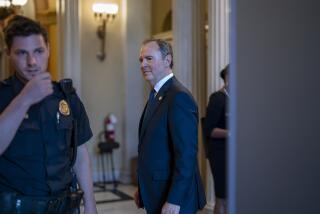Onetime Loyal Aide Now Stands to Undermine GOP
- Share via
WASHINGTON — For 20 years, Kirk Fordham was a loyal staffer and strategist -- rising from his early days as a Capitol Hill intern to the coveted post of chief of staff to a senior congressman.
But Wednesday, amid a scandal that has rattled Capitol Hill and ended the political career of Fordham’s longtime boss, former Rep. Mark Foley (R-Fla.), the 39-year-old aide emerged as a central player in a saga that could bring down the same House GOP leadership that he worked so tirelessly to serve.
No longer a behind-the-scenes operator, Fordham resigned his post as chief of staff to Rep. Thomas M. Reynolds (R-N.Y.), chairman of the National Republican Congressional Committee, and declared his intention to tell all when the FBI calls.
“I have no reason to state anything other than the facts,” Fordham wrote in an e-mail sent to The Times. “I have no congressman and no office to protect.”
Fordham’s assertion Wednesday that he informed House Speaker J. Dennis Hastert’s top aide more than two years ago of Foley’s “inappropriate behavior” with teenage pages contradicted claims from the Illinois Republican and other leaders that they did not know the scope of Foley’s problems until last week’s news reports about sexually explicit instant messages he sent to boys as long as three years ago.
Hastert’s chief of staff, Scott Palmer, denied Fordham’s account in a terse, one-sentence statement.
But Fordham’s decision to speak publicly, coming one day after President Bush offered a stout defense of Hastert amid calls for the speaker’s resignation, handed more fodder to Democrats and others who are accusing the GOP of a coverup. And it put Fordham at the center of a burgeoning scandal during a heated election campaign that was shaping up as a possible defeat for the GOP majority.
For the soft-spoken Fordham, a role as a possible whistle-blower is an unfamiliar one -- but it is perhaps not surprising for a longtime Republican weary of his party’s anti-gay political tactics and concerned that some were planning to make him take the fall. He spoke out Wednesday to denounce what he said were false charges from unnamed sources that he had tried to suppress details to protect his old boss.
A native of suburban Rochester, N.Y., he has worked for Republicans since his college days as an intern for his congressman, one-term Republican Fred J. Eckert, and as a volunteer stuffing envelopes and knocking on doors for a candidate for county executive.
Back then, he was a true-believing conservative.
“He did it all. He did it enthusiastically,” said Stephen J. Minarik, chairman of the New York State Republican Committee.
In 1994, Fordham left the Hill to manage the congressional campaign of Foley, who at the time was a fast-rising but little-known Florida state senator.
The two shared something in common: Both were gay men with private struggles, trying to make their mark in a party that was anything but hospitable to homosexuals.
Foley won the race, despite an opponent who raised his sexual orientation as an issue. Fordham became his chief of staff and stayed with him for 10 years -- advising the congressman on media strategies and helping him become one of the GOP’s most prolific fundraisers.
According to records compiled by the Center for Public Integrity, Fordham sometimes traveled with Foley on trips funded by GOP interest groups, including visits to Scotland, Cape Cod and Chicago.
Fordham’s lawyer, Tim Heaphy, said Wednesday that the trips were solely business-related and the two were never romantically involved.
When Sen. Bob Graham (D-Fla.) announced in February 2003 that he would seek his party’s presidential nomination -- thus making it unlikely that he would run for reelection -- Foley, armed with a fat campaign account, decided to run for his seat. Fordham was his most important advisor.
As Foley began campaigning across the state, a South Florida weekly newspaper, the Broward-Palm Beach New Times, called on him to come out of the closet. It was Fordham who tried to persuade mainstream state political reporters to steer clear of the story, even as the White House moved aggressively to find a different candidate. When the Foley campaign accused Democratic activists of spreading the story, it was Fordham who singled out the “liberal gay press” for leading the charge, according to the South Florida Sun-Sentinel.
It was around that time that, based on Fordham’s assertions this week, his loyalty was tested. Fordham now says he noticed “inappropriate behavior” by his boss related to the House page program and reported it to Hastert’s office.
Foley dropped his Senate bid, citing his father’s illness. In early 2004, Fordham moved to Orlando to work as finance director for the Senate candidate that the White House had recruited in Foley’s stead: Mel Martinez, former secretary of Housing and Urban Development.
Martinez was considered a moderate, and working for him seemed a natural fit for Fordham. But that early comfortable feeling probably dissipated when Martinez campaign literature accused a challenger in the Republican primary of supporting the “radical homosexual lobby” by backing hate crimes legislation that included protections based on sexual orientation.
Still, Fordham continued working for Martinez, who went on to win, and then moved back to Washington to work for a prominent GOP consulting firm before joining Reynolds’ staff.
In the end, it was Fordham’s loyalty to Foley that embroiled him in the scandal -- leading him to counsel his former boss and longtime friend as the news of Foley’s e-mails and instant messages began to surface, and even to ask ABC News to withhold the most explicit messages.
In exchange for limiting details of the instant messages, Fordham supposedly offered ABC’s Brian Ross exclusive news of Foley’s resignation. Democrats in upstate New York subsequently complained that Fordham was trying to limit the scandal involving his former boss and its impact on his new one, Reynolds, who is in charge of the GOP’s House campaign strategy and is locked in a tight reelection battle. Reynolds was also under fire because he had been informed that Foley had sent “over-friendly” e-mails to a 16-year-old former page in 2005 and had said he told Hastert about them.
Fordham’s father, James, said Wednesday that his son’s actions reflected his character and empathy in wanting to shield a friend from humiliation.
“His intentions were only to protect Mark Foley’s family from hearing the ugly details,” he said.
Kirk Fordham declined to answer questions for this report. His northwest Washington home was empty; the quiet of the tree-lined street was interrupted by the television news crews camped out in front of the house.
Speaking this week to his hometown paper, the Rochester Democrat and Chronicle, Fordham said he had learned about the content of the instant messages after arriving at Foley’s townhouse Friday to lend emotional support. Fordham told the paper he was stunned when Foley’s press secretary called from Florida and read him some of the messages.
“I hung up the phone and I turned to [Foley] and I asked him, ‘Are these authentic?’ and he said, ‘Probably.’ ”
Fordham told the newspaper that he quickly went to inform Reynolds. Fordham said that after talking to Reynolds, he took Foley a draft resignation statement, which Foley signed.
He then advised Foley and his sister “to go to a safe place so that they could try to collect themselves emotionally,” he told the paper.
By Wednesday, Fordham was jobless but ready to cooperate with investigators, poised to take on the Republican establishment that was once his professional home.
tom.hamburger@latimes.com
*
Times staff writer Deborah Schoch and researcher Julia Franco, both in Los Angeles, contributed to this report.
More to Read
Get the L.A. Times Politics newsletter
Deeply reported insights into legislation, politics and policy from Sacramento, Washington and beyond. In your inbox twice per week.
You may occasionally receive promotional content from the Los Angeles Times.










